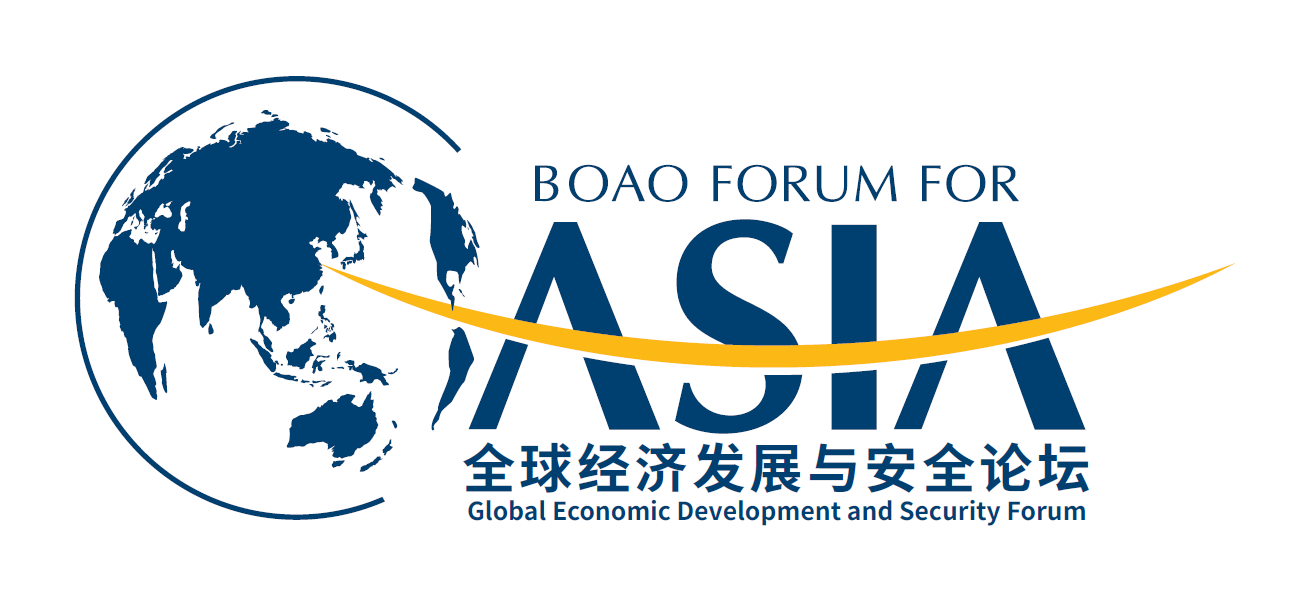周小川 博鳌亚洲论坛副理事长
ZHOU XiaochuanVice Chairman,
Boao Forum for Asia
为了人类未来共担责任共迎挑战
Sharing Responsibilities and
Meeting ChallengesTogether
for the Future of Humanity
亚洲是世界经济增长的压舱石。当前,全球经济面临复苏迟缓的挑战。IMF预计全球经济增长仍低于疫情前的历史平均水平,世界银行认为世界已进入30年来最缓慢增长的5年。高利率环境抑制了全球总需求,一些发展中经济体债务压力持续。许多经济体亟需寻找失落的动能,重回增长轨道。面对诸多的外部制约因素,亚洲国家特别是发展中亚洲仍将成为世界经济增长的压舱石。中国、印度、印尼等国家的增长率均超过4%,亚洲对世界经济增长的贡献预计仍保持三分之二左右。
亚洲是经济全球化的重要支撑。逆全球化思潮抬头,贸易保护主义加剧,脱钩断链,小院高墙,阻碍了关键原材料、中间产品、科技和人才的有效流动,严重损害全球福祉。在此背景下,亚洲多国积极落实《区域全面经济伙伴关系协定》(RCEP)、《全面与进步跨太平洋伙伴关系协定》(CPTPP)、《数字经济伙伴协定》(DEPA)等新型、高标准贸易规则,并以此推动WTO规则与时俱进。妥善处理贸易争端,反对单边主义与搞阵营对抗和排他性的小圈子,让经济全球化惠及每一国每一人,是亚洲的坚定呼声。
亚洲是实现绿色低碳发展的关键地区。2023年,全球气候行动面临巨大缺口,绿色产业革命需要巨额资金技术投入。在迪拜召开的第28届气候变化大会达成具有里程碑意义的“阿联酋共识”,为能源系统转型摆脱化石燃料按下加速键。作为全球人口最多、能源消耗和碳排放最多的地区,亚洲肩负着绿色低碳发展的艰巨任务。同时,作为“世界工厂”,亚洲拥有世界清洁生产的核心技术,集中了全球清洁能源投资,在绿色生产、基础设施建设、资金和技术合作上积极有为。
亚洲是科技创新和数字经济发展的新兴力量。科技创新和数字经济已成为新一轮国际竞争核心领域,数字服务贸易和跨境电商等新业态正重构国际经贸格局,生成式人工智能成为全球治理焦点问题。亚洲已形成多个科技创新集聚区,正在塑造全球数字创新的未来,数字经济规模占GDP比重超过38.5%。在加强全球科技治理,促进公平竞争和数据安全有序跨境流动,让人工智能与人类的多元价值对齐,缩小数字鸿沟,保护劳动者权益上,世界期待亚洲方案。
在同一个星球上,同一个地球村,亚洲好可以促进世界好,但只有世界好亚洲才能好。亚洲各国外部面临着世界格局大变革带来的巨大挑战,内部面临着亟待解决的重大政治经济议程。亚洲应与世界携手,共同推动全球治理,使世界重返和平、稳定和可持续发展的轨道。这是我们的责任。
中国国家主席习近平指出,中国愿同国际社会一道,以人类前途为怀、以人民福祉为念,推动构建人类命运共同体,建设更加美好的世界。中国将集中精力实现中国式现代化,加快形成新质生产力,积极倡导平等有序的世界多极化和普惠包容的经济全球化。这是中国的担当。
博鳌亚洲论坛作为立足亚洲、面向世界的全球政商对话平台,将携手论坛会员合作伙伴与志同道合之士,为增进亚洲内部以及亚洲与世界的理解,为共担责任共迎挑战多做工作。希望各位嘉宾在年会上畅所欲言,为亚洲与世界携手,为了人类的未来贡献力量。
Asia is the cornerstone of world economic growth. The tepid recovery remains a challenge for the global economy. The IMF forecasts that the global economy will continue to grow at a level below the pre-COVID-19 historical average, while the World Bank believes that the world has entered its slowest five-year growth phase in 30 years. The high interest-rate environment has suppressed global aggregate demand, and some developing economies are still weighed down by their debt burden. Many economies direly need to regain their lost growth momentum. Faced with many external constraints, Asia — and particularly developing Asian countries — will continue to be the cornerstone of world economic growth. Countries such as China, India and Indonesia are all growing at more than 4%, and the continent is still expected to account for about twothirds of world economic growth.
Asia is a key pillar of economic globalization. The rise of anti-globalization sentiment, heightening protectionism, decoupling and severing of supply chains, as well as taking the “small yard, high fence” approach, have obstructed efficient flows of key raw materials, intermediate products, technology, and talent, significantly damaging global well-being. In this context, many Asian countries have implemented new and high-standard trade rules such as the Regional Comprehensive Economic Partnership, the Comprehensive and Progressive Agreement for TransPacific Partnership, and the Digital Economy Partnership Agreement, so that WTO rules may be brought up to date. Asia firmly believes in handling trade disputes appropriately, opposing unilateralism, camp confrontations and exclusive small circles, as well as allowing economic globalization to benefit every country and individual.
Asia is a key region for making green, low-carbon development a reality. In 2023, there was a major gap in global climate action. The green industrial revolution requires enormous commitment in funding and technology. The UAE Consensus reached at the COP 28 UN Climate Change Conference in Dubai, calling for an accelerated transition from fossil fuels to reach net zero, is an important milestone. As the most populous region with the world’s highest energy consumption and carbon emissions, Asia assumes the arduous task of green, low-carbon development. At the same time, Asia, the “world’s factory,” has core technologies for clean production and has brought together global clean energy investment. It has actively contributed to green production, infrastructure development, as well as funding and technological collaboration.
Asia is an emerging powerhouse in technological innovation and the digital economy. Technological innovation and the digital economy have become key areas in the latest wave of international competition. New forms of businesses such as digital services trade and cross-border e-commerce are reconstructing the international trade landscape. Meanwhile, generative AI has become a key issue in global governance. Technological innovation clusters abound in Asia, and are shaping the future of global digital innovation. The digital economy has surpassed 38.5% of GDP. The world awaits an Asian solution that will strengthen global technology governance, promote fair competition, foster safe and orderly cross-border data flows, help align AI with diverse human values, narrow the digital divide, and protect labor rights.
Sharing the same planet and being members of the same global village, what benefits Asia benefits the world, and vice versa. Externally, Asian countries face enormous challenges resulting from significant changes in the global landscape. Internally, major political and economic agendas need to be urgently addressed. Asia should work together with the rest of the world, and jointly advance global governance so that the world can return to a peaceful, stable and sustainable track. This is our responsibility.
With the future of humanity in mind and taking the well-being of the people to heart, China’s President Xi Jinping said that China is willing to work with the international community to promote the building of a community and a better world. China will focus on achieving a Chinese path to modernization, accelerating the creation of new quality productive forces, and actively advocating the construction of a fair and orderly multipolar world and inclusive economic globalization. This is China’s responsibility.
Based in Asia and facing the world, the Boao Forum for Asia serves as a global platform for political and business dialogue around the world. It will work together with Forum members and partners as well as like-minded individuals to increase understanding within Asia and between Asia and the rest of the world, as well as to share responsibilities and meet challenges. I hope that all our distinguished guests will speak their minds freely at the annual conference, and contribute to Asia’s collaboration with the world and to the future of humanity.
来源:博鳌亚洲论坛
